It’s totally easy and possible to clean your whole house naturally – without toxic chemicals! This post is the perfect guide to non-toxic cleaning tips and DIYs for your home.
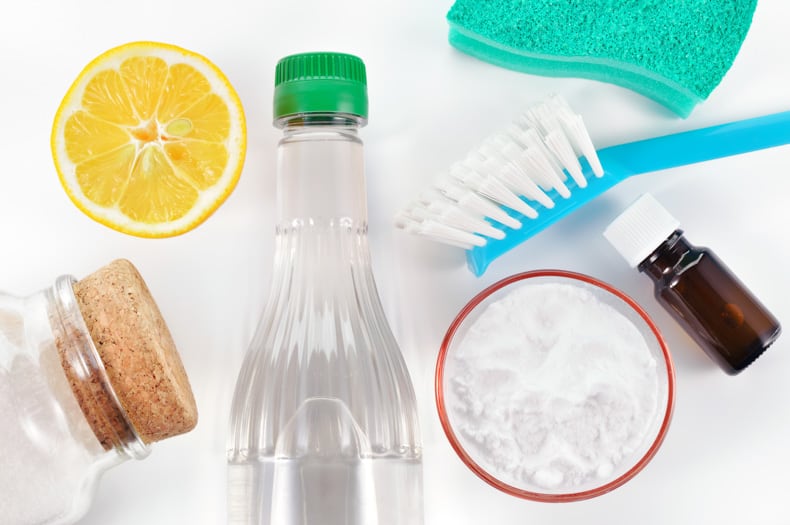
This post was originally written by guest writer Kelly Oribine in 2012, & was updated & expanded in 2021 by Beth Ricci.
When I got married, I honestly didn’t care about having non-toxic cleaning products. We lived in an old apartment full of character and cobwebs, and I considered bleach my new best friend.
After kids, I thought twice about our household cleaners. Surely the things we breathe and come into contact with on a daily basis would affect our health, right? I bought things with words like “organic” and “natural” and “pure” on the labels, but I was fairly certain I was being sold a lie. And, at least some of the time, I was.
When my son was born he was sensitive to just about anything unnatural. We began to ditch toxic chemicals full force and I’m so glad we did.
Conventional cleaners are usually toxic and aren’t something I want to use around my family. My new rule of thumb?
Cleaning products shouldn’t be more dangerous than the problem I’m trying to solve.
Making your own cleaners is a simple and inexpensive way to clean your home naturally, without toxic chemicals. It doesn’t have to be fancy or complicated. I like that these cleaners are safe for my kids to be around. And I don’t need to totally freak out if they accidentally get into it.
This post is going to give you a solid overview of how non-toxic cleaning (with a little know-how and certain multi-use ingredients) really can effectively tackle the whole house. Here’s what we’ll cover:
Table of contents
Why Non-Toxic Cleaning?
I think most people know by now that there are plenty of pretty nasty ingredients lurking on the store shelves – especially in the household supplies aisle. Toxic ingredients can have tongue twister names and are linked with issues like asthma, allergies, skin reactions, eye damage, lung damage, and many more.
The best part is that natural cleaners are generally less expensive and definitely way safer. Bonus points: they won’t burn your lungs either!
Tools you Need to Clean Your Whole House
In addition to the ingredients, there are a few supplies I like to keep on hand.
- Microfiber and glass cleaning cloths (Norwex is my favorite – I can’t live without the Enviro Cloth for general cleaning, and the Window Cloth for perfectly streak-free glass and stainless steel.)
- Glass spray bottles
- Jars with lids
- Bucket and mop
- Scouring pads and/or scrub brush
Multi-Tasking in Your Chemical Free Cleaning
It’s so easy to get caught up in all of the beautifully packaged natural cleaners at the store. We don’t need a different cleaner for every surface in our house though! Just a few simple ingredients come together to tackle a wide variety of messes.
Basically – we need items that will perform a few essential functions, like lifting dirt and degreasing. Here are some cleaning staples I keep on hand to use for DIY non-toxic cleaning recipes.
Ingredients/Supplies to Clean Your Home Naturally
- White vinegar – shines, removes hard water stains, and degreases
- Dish soap – lifts dirt, degreases, and disinfects
- Baking soda – mild abrasive to scrub away stuck-on messes
- Washing soda – scrubs away messes and degreases
- Hydrogen peroxide – disinfects and lifts away dirt
- Essential oils – have antimicrobial properties and make your home smell amazing
- Olive oil – (or other vegetable oil) shines and protects wood
- Castile soap – lifts dirt, degreases, and disinfects
Mixing Cleaners Ingredients?
Some ingredients don’t play together nicely and should NOT be mixed together. For example, dish soap (which is technically a detergent), and vinegar can be used together. The soap helps remove soap scum and degrease, while the vinegar doubles the degreasing and mineral busting power. However castile soap and vinegar don’t mix.
Here’s a quick guide on what natural cleaners to avoid mixing in the same container (or at all):
- Vinegar and hydrogen peroxide (creates peracetic acid)
- Vinegar and castile soap – the vinegar unsaponifies the soap so instead of the best of both worlds we get a goopy mess.
- Baking soda and vinegar (1st-grade volcano experiment anyone??). This is ok to do on a surface (like the oven), but don’t try to mix them in a container to store.
Non-Toxic Cleaning Products You Can Make
Here’s how to clean your whole house with non-toxic cleaning products! With just a few simple recipes we can clean the entire house.
1. Homemade Soft Scrub
This is a heavy duty cleaner for tough messes, but gentle enough for kids to be around. Mix some baking soda in a small bowl with enough hydrogen peroxide to make a paste. Use a scrubby sponge to scrub the mess away. If you have sensitive skin you may want to wear rubber gloves. Try this on rust stains, soap scum, and dirty grout lines.
2. Disinfectant Spray
If you’re wondering how to sanitize without toxic chemicals, a natural disinfectant is your answer. Many essential oils have antimicrobial properties and are a great addition to natural cleaners. Tea tree (aka melaleuca) is one of my favorite essential oil to disinfect with. I place some in a spray bottle filled with water when I feel the need to disinfect something. Other people like the “thieves” blend, which is several antimicrobial essential oils together.
Other disinfecting ingredients you could use instead as a spray:
- vinegar (disinfectant, acidic to break down dirt)
- rubbing alcohol (disinfectant, effective solvent, evaporates quickly)
Note: these ingredients (essential oils with disinfectant properties, vinegar, rubbing alcohol) all have disinfectant ability, but none are 100% effective in lab tests. However – most homes aren’t aiming for a sterile environment, so this is not necessarily a bad thing. Most sources agree that these natural ingredients are effective enough to handle typical household germs in regular day-to-day needs.
If you want a grab and go option, try some of these DIY disinfectant cloth wipes.
Keep in mind that essential oils are potent and should be kept away from little hands. I suppose that goes for all home cleaning supplies, natural or not! Other good essential oils for cleaning include:
- lemon
- clove
- orange
- grapefruit
- eucalyptus
- lime
- pine or fir needle
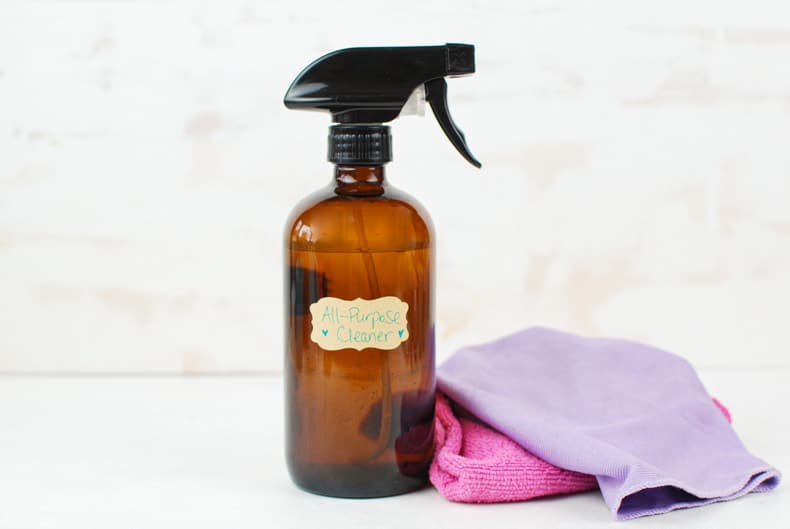
3. All-Purpose Cleaner
Most things can be cleaned with a bucket full of warm water with either a squirt of a non-toxic dish soap or a splash of vinegar. Either of these solutions are great for cleaning cabinets and walls, the inside of your refrigerator, and nearly any hard household surface that needs a gentle cleaning.
If you don’t want to haul a bucket of soapy water around then spray is another option. I use this simple all-purpose cleaning spray.
4. All Natural Window Cleaner
I use a spray bottle full of vinegar as a glass and mirror cleaner, along with my Norwex Window Cloth. This combo is my fave, and super effective for anything made of glass or stainless steel. It leaves zero streaks behind, unlike any other cloth I’ve ever tried.
How to Clean Everything Without Toxic Chemicals
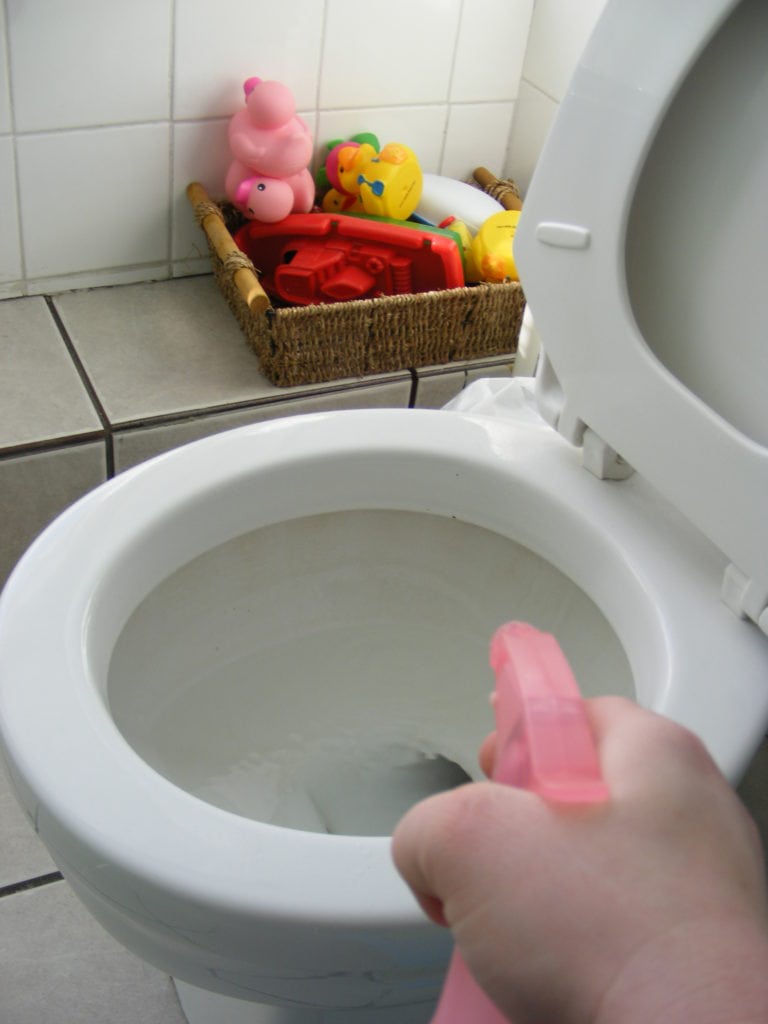
Tackle the Toilets
What I like about commercial toilet cleaners is the special bottle design that allowed me to get the cleaner under the toilet bowl rim. A great way I’ve found to copy this is by putting my toilet bowl cleaner in a spray bottle with the nozzle set to stream. Straight vinegar works just fine, but you can also add some essential oils for scent.
Mini Blinds
Clean vinyl mini-blinds with natural dish soap, some vinegar, and hot water. If you don’t like tediously cleaning each individual blind, then do it in the bathtub. Remove the blinds, clean them in the tub, then rinse off with the showerhead. Lay on some towels to dry before rehanging.
For the wider, wooden blinds, a Norwex cloth with a little water works great.
Cleaning Floors
I mop my tile and laminate floors by adding a big splash of vinegar and a few drops of a favorite essential oil to a bucket of warm water. The vinegar smell will disappear as your floors dry. I promise your house won’t smell vinegary when you’re done! For extra dirty floors (i.e. at my house, lol) you can add some soap (I use a squirt of dish soap) to the bucket.
Freshen Carpet and Knock Out Stains
Hydrogen peroxide works wonders on tough stains. Just be sure to do a patch test first on an out of sight piece of carpet! To freshen carpets, heavily sprinkle baking soda over them. Let the baking soda sit for a few hours to overnight before vacuuming.
Mattresses and Furniture
Here’s a simple recipe to freshen your mattress or sofa.
- Put some baking soda into a shaker jar or a mason jar with holes nailed into the lid.
- Add a few drops of your favorite essential oil. Lavender, tea tree, lemon, or any from the essential oil list above are good options. Shake well to combine.
- Sprinkle the mixture onto your mattress, upholstered furniture, or carpet, and leave it for an hour or so before vacuuming the solution up.
Wood and Leather
Sealed wood can be polished with a soft cloth with a tiny bit of diluted vinegar and olive oil on it. If you’re looking for non-toxic cleaning products for your leather, you don’t have to resort to expensive (and nasty) cleaning kits. This wood and leather balm adds a nourishing layer of wax and oil and helps condition leather fabric.
Non-Toxic Cleaners for the Kitchen
Stainless Steel
Put some undiluted vinegar in a spray bottle and use it to wipe down stainless steel surfaces. You can also put a little bit of vodka or rubbing alcohol in the bottle to help the mixture dry faster and avoid streaks.
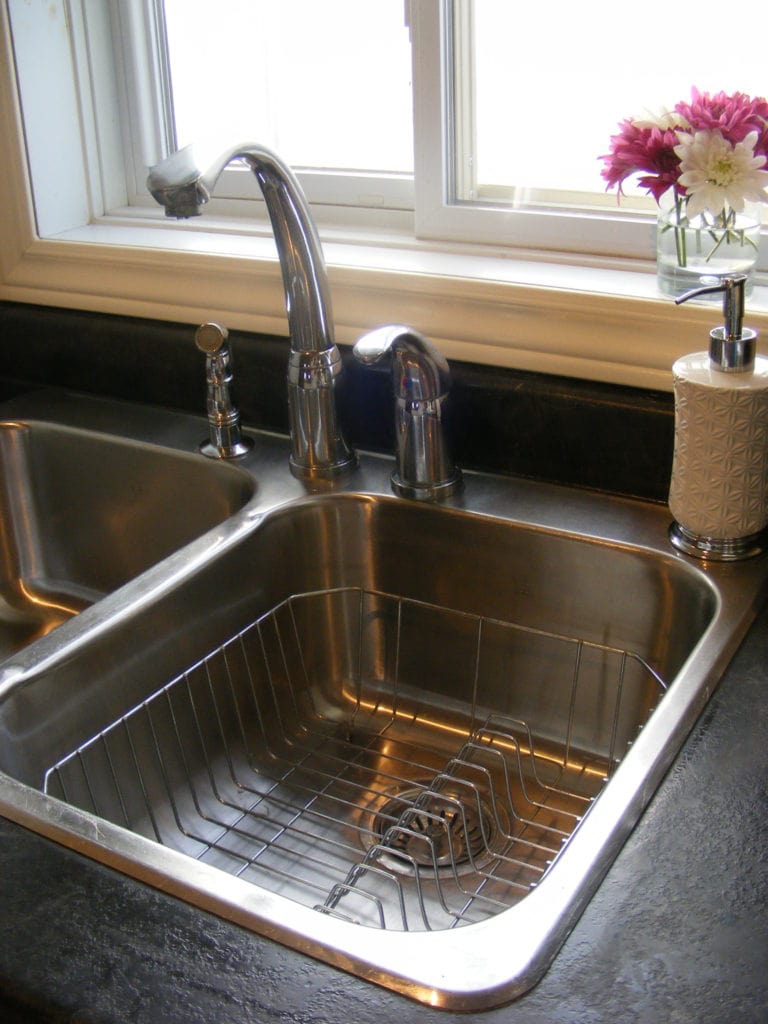
Sinks and Drains
You can easily shine your kitchen sink with basic ingredients. Use a little baking soda and water, plus elbow grease to scrub the dirt and grime away. A little bit of dish soap can also be added to the mix if needed. Then spray vinegar and scrub all residue away. Finish by drying with a microfiber cloth until it shines! (As mentioned above – the Norwex Window cloth is awesome for this.)
To remove stinky drain smells, pour a couple cups of warm vinegar down and let sit for half an hour. Run hot water to rinse afterward. You can also run some citrus peels through the garbage disposal if you have one.
Non-Toxic Cleaning for the Microwave
This is so easy and it works really well. The vinegar does smell up the kitchen for a bit, but you can use lemon juice if preferred.
- Put ½ cup of vinegar and ½ cup of water in a glass microwaveable bowl. Or use a few tablespoons of lemon juice in water.
- Microwave on high until it’s boiling and has covered the walls of the microwave in condensation This takes about 5 minutes.
- Let sit for 3 minutes before carefully removing the bowl. Wipe the surface clean with a cleaning cloth or dishcloth.
Put the Kettle On
To descale your kettle, put enough vinegar in it to cover the limescale and mineral deposits. Boil the vinegar in the kettle, and then rinse the kettle well.
Natural Oven Cleaner
Oven cleaner was the last cleaner I eliminated and the one I was most uncomfortable using in my home. I kept trying homemade solutions, discovering they didn’t work, and then going out and buying the can of spray-on oven cleaner. Yes, it works wonders, but leaves me nervous to let my children breathe the air in our home!
The best natural oven cleaner I’ve found is Shaklee’s Scour Off. It works noticeably better than any of the homemade solutions I’ve tried. If you’d prefer a homemade cleaner, the homemade soft scrub listed above works pretty well with a generous dose of elbow grease.
Clean Up Your Laundry
While laundry doesn’t usually get lumped in with cleaning, it’s still something that calls for cleaning products. Conventional laundry detergents and fabric softener use synthetic fragrances and harsh chemicals that can cause skin irritation. What goes in our washing machine goes on our clothing and then gets on our skin.
If you want non-toxic cleaning products in the laundry room, then give these a try:
- Instead of dryer sheets, try some reusable wool dryer balls. They work great and are way more environmentally-friendly because you reuse them for years.
- For laundry detergent, ECOS and Seventh Generation both use natural ingredients and are free of harmful chemicals.
- Conventional stain removers are also chemical-laden products I avoid, but hydrogen peroxide works for most stains.
You can read more about how I do laundry without toxic chemicals here.
Where to Buy Natural Cleaners
If you’re too busy to DIY or that’s not your thing, then there are other options. Some of these natural products you can find next to the conventional cleaning products at your local grocery store. My top criteria for choosing natural cleaners includes non-toxic cleaning ingredients and high values. While many cleaners don’t make the list, there are plenty that do.
Keep in mind that a good all-purpose spray will cover most bases, and we don’t need a gazillion different cleaners. That said, here are some recommended non-toxic cleaning companies to buy from.
- Norwex
- Nature Clean (Canadian brand)
- Aunt Fannies
- ECOS
- Whoa Nelli
- Branch Basics
- Bronner’s castile soap and Sal Suds
Avoid Greenwashing
Unfortunately, there are a lot of companies out there that boast “naturally derived” ingredients “simple ingredients” or just use natural colors like green in their packaging. This doesn’t automatically make them safe and non-toxic though!
Always look at the ingredient list to find the best natural cleaning products. Even some green cleaning products contain ingredients that can cause unwanted health effects in humans. It’s best to look for safer products that work for both the environment and people!
The Environmental Working Group is a great resource for finding safe cleaning products. The EWG looks at the product ingredients and rates them by how safe they are for both people and planet. While I may not agree 100% of the time with their analysis, they’re a great starting point, and can be very eye-opening!
Non-Toxic Cleaning Made Simple
Making your own non-toxic cleaners is a simple way to avoid the toxins in many common cleaning products. It doesn’t have to be complicated or expensive. And if you’re just not in the mood to DIY, you’ve still got natural cleaning options easily accessible!
Don’t miss my Spring Cleaning Checklist: The Ultimate Guide for Busy Families!
With a little awareness and know-how, you can clean your whole house with natural, non-toxic cleaning supplies. Happy scrubbing!
***
Kelly lives in rural Ontario Canada with her husband, their six kids, and a small brood of far-too-friendly backyard chickens.
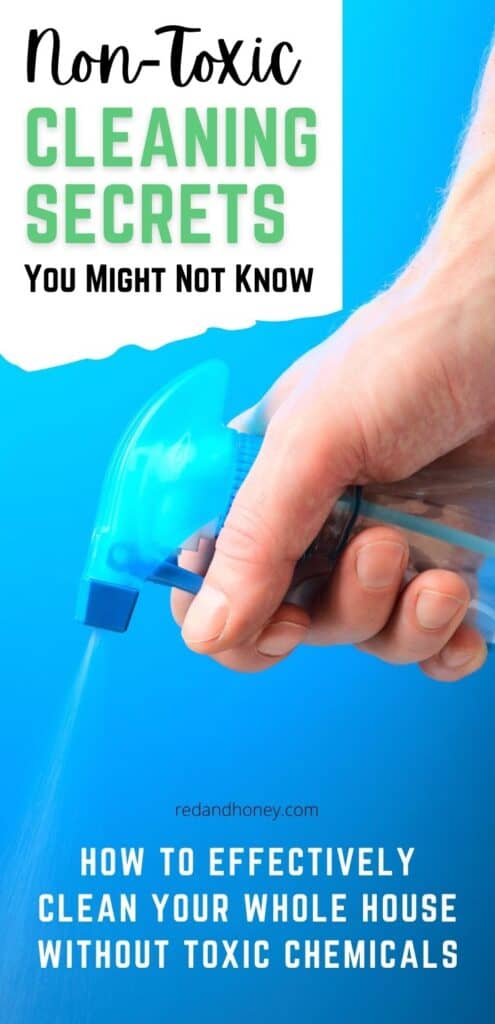

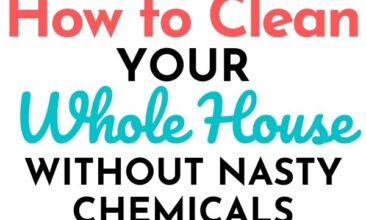
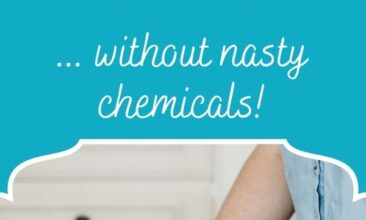
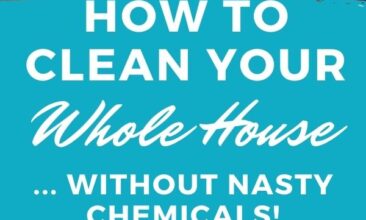
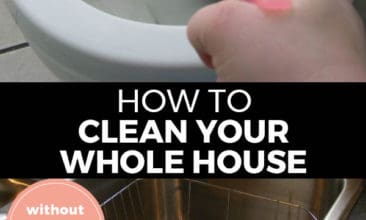
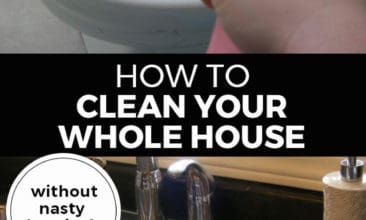
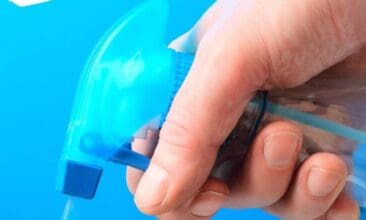
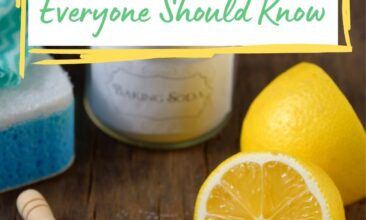
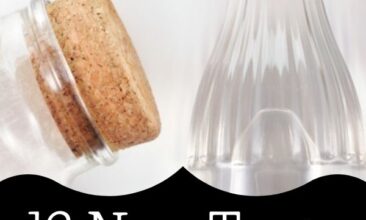
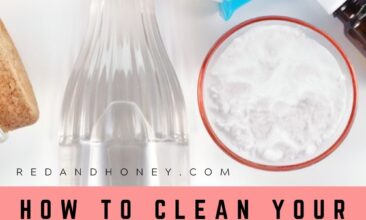
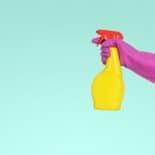
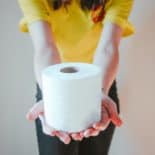
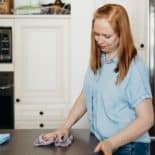

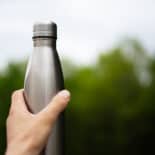

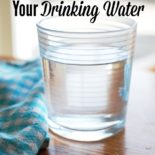


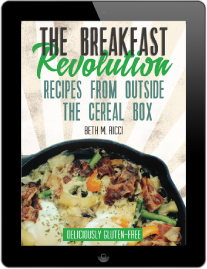

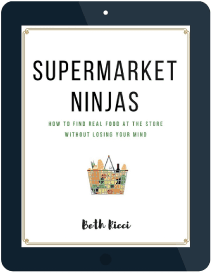
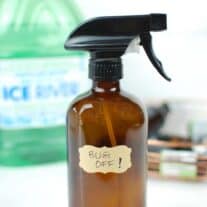
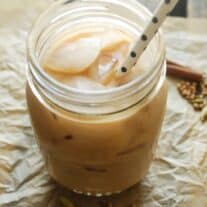
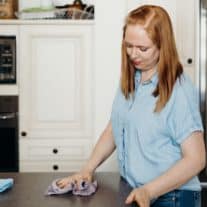
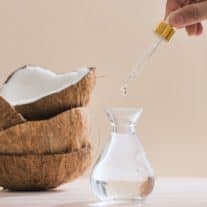
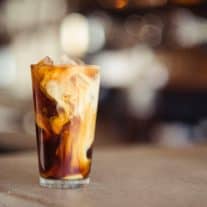


Pool filter
I actually use some of these methods cleaning swimming pool filters. works like a charm.
Tina
Be careful with tea tree oils, and some other essential oils, as they can be toxic to pets. Make sure you research them first.
Mildred Miller
Thank you for your post! I found it so encouraging in that I could check off the boxes on all of them. Sometimes I wonder if I’m on the right track…and this helped me feel like I’m not failing today.Very good and simple guides to helping one’s home be where it needs to be. I have a little card that I keep on my desk…An effort a day keeps failure away. Keeping our homes nice doesn’t have to be a monumental task.
Ho San
From the professional laundry provider point of view, the combination of vinegar and baking soda is an excellent solution for removing oil and grease stain but it leaves behind an undesirable odor behind. Adding fresh lavender or rosemary herbs into the solution will mask the vinegar scent with fresh herbs.
https://www.laundrycares.com/
Beth
Actually, I never have a lingering vinegar smell. When vinegar evaporates, the smell goes away completely. Even if I use it to spray surfaces while cleaning, it only smells for as long as its wet. If I wanted a specific scent like lavender, I’d probably use a drop of essential oils, personally.
Moriah
Great post, I’m so happy to find an all-in-one-how-to-clean-nontoxically! 🙂
Question though, everybody talks about vinegar, are they/you always talking about white vinegar? I really want to use ACV whenever vinegar is called for because I am getting into making my own and the less stuff I have to buy from the store, the better.
Thanks!!!
Beth
I think either one could work, but I’ve always used white vinegar. I’ve never heard of anyone using ACV but if you try it, come back and let me know how it works for you! (I use white vinegar because it’s cheaper to buy!)
Stephanie
Hey Beth!
I really love your content, is it ok if I share some of your tips in my blog ?
I’ll credit your blog as well.
http://www.ultimatelaundry.sg
Kailey
Just a little tip: if you have cats you should NOT use essential oils because they are VERY toxic for them. Be careful and look at for your furry friends.
Sara D
http://www.saradelgado.norwex.biz
Sara D
Hello I just want to share with you a great way to clean without harsh chemicals, it’s using Norwex! They use a super microfiber infused with silver!
Beth
I love Norwex stuff! 🙂 I wrote a review post here: https://redandhoney.com/good-true-honest-review-norwex-cleaning-supplies/
Marilyn Martin
Amazing recipes! These recipes are fantastic. I have used this one for the toilet. I am so happy I have found your post! It is really useful. Keep posting!
Mercedes Watson
Great tips. It is very important to clean with eco-friendly ingredients. I clean my windows with lemon juice and water. I hope I was useful. They shine so bright after the lemon juice. Greetings!
Sue@Natural Living
We found these ideas and recipes extremely useful – easy to follow and totally non-toxic; thank you.
Rebecca R.
So nice to keep learning more about essential oils and natural ways to clean! :-). We are surrounded by so many chemicals… Good to avoid where possible!
Kimanh
Hey, this is an awesome post.
I thought you might like to know a glass cleaning solution that is absolutely awesome. (I saw it on a house cleaning show in the UK).
Mix water with a squirt of washing liquid, and a teaspoon of cornflour (starch), shake it up and spray on to glass. Use any rag to clean the glass, but then use a dry microfibre cloth to wipe the solution off. Absolutely perfect glass every time!
The washing liquid is to take the oil and grime off, and the flour acts as a mild scrub to take dirt off.
Hope you try it out 🙂
(can also use from a bowl, doesn’t have to be sprayed on.)
Kimanh
Rose Turner
Baking soda absorbs odors. Use shallow dishes around the home to absorb odors naturally. Essential oils can be used to add a pleasing scent to your room. Use on cotton balls in shallow dish placed in inconspicuous places. Manor Park Carpet Cleaners Ltd.
Faith Grant
This is such a great blog post! I love all the tips and suggestions. I am so bad at cleaning. I try to spend 5 minutes a day de-cluttering but the task of chores and cleaning is always so daunting to me. Thanks!
Stacy Ross
We use vinegar for floor cleaning. It provides excellent cleaning and shine to the floor, but its unbelievable for me that it have uncountable benefits that you have shared. Thanks for this wonderful resource.
Office Cleaning Company Arizona
Cleaning is big task for every one but you made it easy. Thanks a lot for the post infect wonderful post……
Window Cleaning Services
Loved the new tasks thanks I’ll make a try for them.
Ianna @ Topbest Termite Control
Thank you for sharing great and informative tips that will lessen the consume of chemical home cleaners that may harm the health of my family. I will definite do all of these tips that you shared.
marie
also try Nordic Microfiber at http://www.ultramicrofibers.com